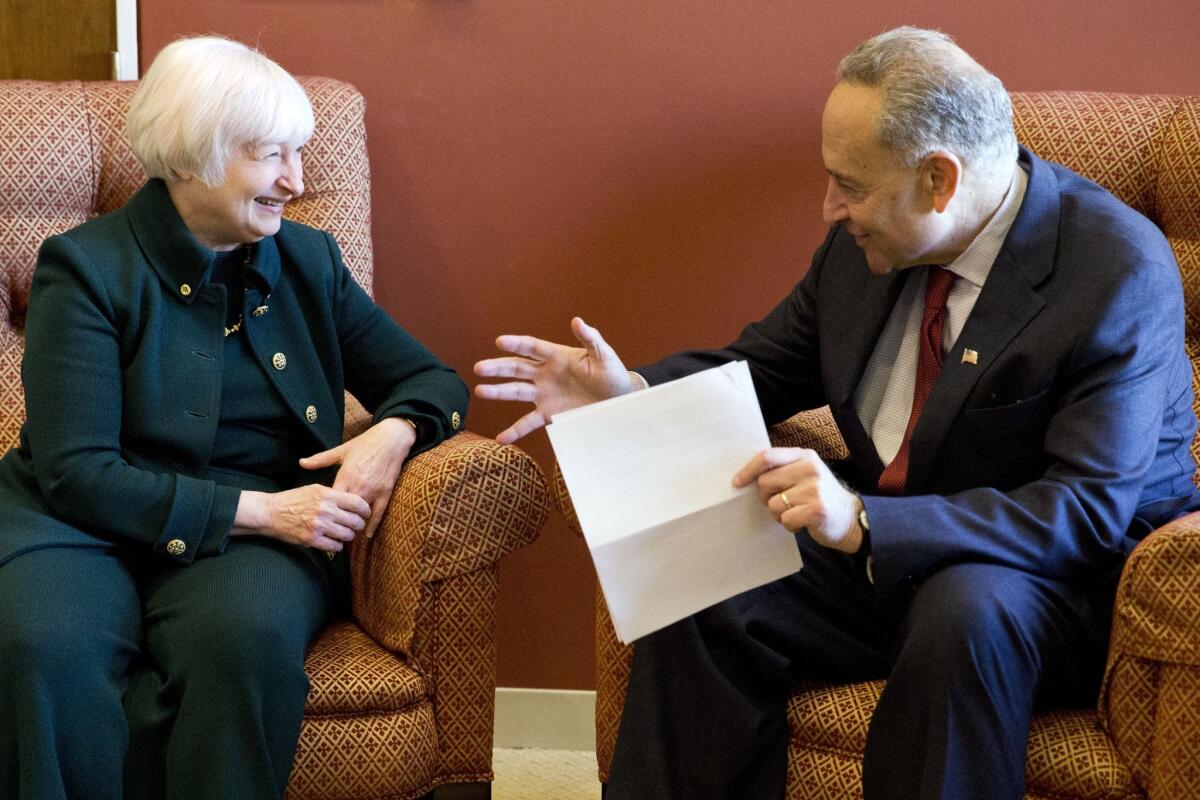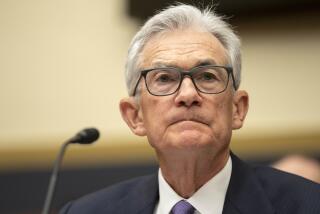Five things to watch for at Janet Yellen’s confirmation hearing

WASHINGTON -- The last time Janet L. Yellen faced a Senate confirmation hearing, she shared the witness table with two other nominees for about 90 minutes, answered a handful of relatively mild questions and was on her way to an easy confirmation to be vice chair of the Federal Reserve.
On Thursday, as President Obama’s choice to be the next chief of the powerful central bank, Yellen’s experience is likely to be much different.
Her confirmation hearing before the Senate Banking Committee comes as the Fed continues to play an outsized role in the U.S. economy. The central bank’s balance sheet has more than quadrupled to nearly $4 trillion since 2008 amid unprecedented and controversial efforts to stimulate growth.
QUIZ: How well do you understand the Fed stimulus?
In addition, Yellen’s selection to succeed Ben S. Bernanke is historic. If confirmed as expected, she’d be the first woman to lead the Fed or the central bank of any of the so-called Group of Seven top industrialized world economies.
Here’s what to watch for at the hearing, which begins at 7 a.m. Pacific time.
Taper talk
Whenever any Fed official talks these days, people listen for any hint of when the central bank will start tapering its $85 billion in monthly bond purchases, the latest round of so-called quantitative easing that began in September 2012.
Yellen has been a strong supporter of the bond-buying program, so anything she says about its future will be of interest to investors.
Many Republicans have opposed the bond purchases, arguing the Fed is risking high inflation by continuing to pump money into the economy, so they are likely to push Yellen on how much longer the program will continue.
In her prepared testimony, released Wednesday, Yellen did not specifically mention the stimulus program. But she said that the economy still needed more help.
With an unemployment rate that at 7.3% “is still too high” and inflation running below the Fed’s long-term goal of 2%, the Fed was justified in continuing to use monetary policy actions to boost growth, Yellen said.
“A strong recovery will ultimately enable the Fed to reduce its monetary accommodation and reliance on unconventional policy tools such as asset purchases,” Yellen said in her four-page statement. “I believe that supporting the recovery today is the surest path to returning to a more normal approach to monetary policy.”
Inflation vs. unemployment
Yellen is widely viewed as being willing to tolerate higher levels of inflation in order to reduce unemployment, which in Fed-speak is known as being an inflation dove.
Lindsey M. Piegza, chief economist at Sterne Agee, said that, as she expected, Yellen’s prepared testimony “reaffirms her dovish tone and commitment to further accommodation.”
So far, the Fed’s policies have not caused high inflation.
But expect Yellen to be pressed by Democrats and Republicans on her views about whether the Fed should focus more on keeping inflation low or reducing unemployment.
The Fed has a dual mandate to maintain price stability and maximize employment. Many Democrats think the Fed should be doing more to lower the still-high unemployment rate, while some Republicans have advocated returning the Fed to its original mandate of simply minimizing inflation.
Audit the Fed
Sen. Rand Paul (R-Ky.) has said he would delay a vote on Yellen’s confirmation by the full Senate unless he gets a vote on his legislation allowing audits of the Fed’s monetary policy decisions and actions. Paul has taken up the “Audit the Fed” cause championed by his father, former Rep. Ron Paul (R-Texas).
Yellen has been outspoken about improving the transparency of the Fed’s actions, and Bernanke appointed her to head a subcommittee on the central bank’s communications.
But Bernanke has been clear that allowing audits by the Government Accountability Office of the Fed’s monetary policy activities would endanger the central bank’s independence.
Paul is not on the Senate Banking Committee. But half of the Republicans on the panel are co-sponsors of his legislation, so Yellen is likely to be asked whether she would support more expansive audits (the Fed already faces other types of audits).
She’s not expected to be in favor of Paul’s legislation, and that could open the door for Republicans to criticize her commitment to transparency.
Yellen did not mention expanded audits in her prepared testimony but said she was committed to more openness in the Fed’s communications.
Better Fed communication
Yellen headed a Fed subcommittee that recommended the central bank communicate its longer-term policy objectives more clearly, what’s known as forward guidance. That effort did not get off to a great start this spring when Bernanke tried to signal the Fed’s parameters for tapering the stimulus program.
Bernanke triggered a 250-point swing in the Dow Jones industrial average in May when he testified before Congress, first saying the Fed could start scaling back its bond purchases in a few months, then cautioning against acting too quickly.
Bernanke and other Fed officials sent strong signals through the summer that they were ready to taper at their September meeting, then surprised investors by not doing so. Senators probably will ask Yellen about the mixed messages from the Fed and how she would avoid such problems in the future.
In her prepared testimony, Yellen said that “monetary policy is most effective when the public understands what the Fed is trying to do and how it plans to do it.”
Watching the banks
The 2010 financial reform law expanded the Fed’s oversight role and it is involved in drafting some key new regulations, such as the Volcker Rule prohibition on proprietary trading by banks.
Yellen was president of the Federal Reserve Bank of San Francisco from 2004-10, when the subprime housing market was booming. In that position, she oversaw a host of banks in California, Nevada and seven other western states.
During her 2010 confirmation hearing, Sen. Richard Shelby (R-Ala.) questioned her about the large number of bank failures in that district after the collapse of the subprime housing market.
Yellen has noted that the Fed didn’t oversee some of the failed banks that were the biggest players in the region’s housing market, including IndyMac Bank and Washington Mutual. But Shelby could press her on the issue again.
Senators also could ask Yellen about her comments in 2005. She warned about the risks of soaring housing prices but said she did not think that a bursting housing bubble would have “an exceedingly large effect” on the economy.
In Yellen’s prepared testimony for Thursday’s hearing, she said banks are stronger now and the financial system is more stable. But there is more work to do in strengthening regulatory overisight, she said.
“I am committed to using the Fed’s supervisory and regulatory role to reduce the threat of another financial crisis,” Yellen was set to tell senators.
ALSO:
Merger of American Airlines and US Airways cleared for takeoff
Southern California home prices are flat for fourth month in a row
Treasury official tapped to lead Commodity Futures Trading Commission







